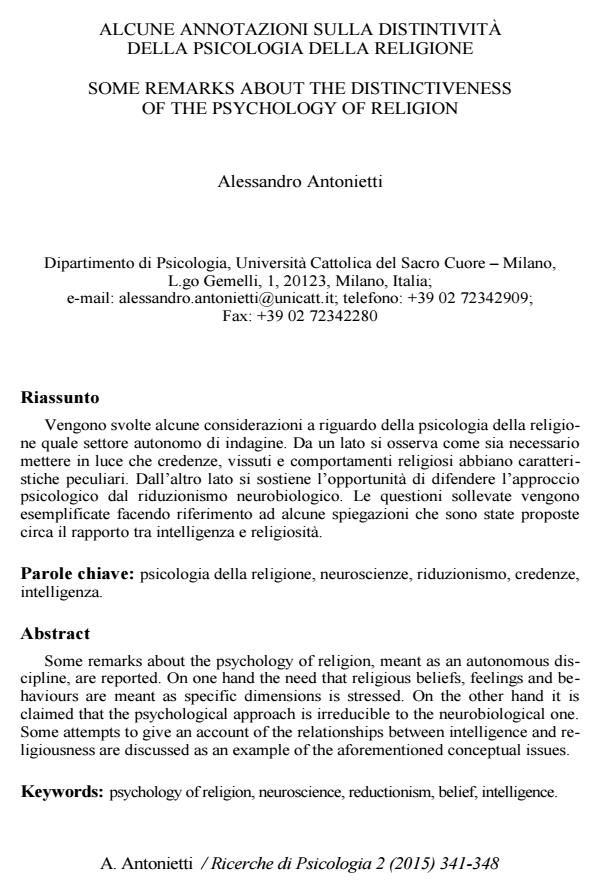Some remarks about the distinctiveness of the psychology of religion
Journal title RICERCHE DI PSICOLOGIA
Author/s Alessandro Antonietti
Publishing Year 2015 Issue 2015/2 Language Italian
Pages 8 P. 341-348 File size 158 KB
DOI 10.3280/RIP2015-002004
DOI is like a bar code for intellectual property: to have more infomation
click here
Below, you can see the article first page
If you want to buy this article in PDF format, you can do it, following the instructions to buy download credits

FrancoAngeli is member of Publishers International Linking Association, Inc (PILA), a not-for-profit association which run the CrossRef service enabling links to and from online scholarly content.
Some remarks about the psychology of religion, meant as an autonomous discipline, are reported. On one hand the need that religious beliefs, feelings and behaviours are meant as specific dimensions is stressed. On the other hand it is claimed that the psychological approach is irreducible to the neurobiological one. Some attempts to give an account of the relationships between intelligence and religiousness are discussed as an example of the aforementioned conceptual issues.
Keywords: Psychology of religion, neuroscience, reductionism, belief, intelligence.
- Boyer, P. (2003). Religious thought and behaviour as by-products of brain function. Trends in Cognitive Sciences, 7, 119-124.
- Fabbro, F. (2010). Neuropsicologia dell’esperienza religiosa. Roma: Astrolabio.
- Fontana, D. (2003). Psychology, religion, and spirituality. New York: Wiley.
- Ganoczy, A. (2008). Christianisme et neurosciences. Paris: O. Jacob.
- Girotto, V., Pievani, T., & Vallortigara, G. (2008). Nati per credere. Torino: Codice Edizioni.
- Jeeves, M., & Brown, W.S. (2009). Neuroscience, psychology, and religion. West Conshohocken, Pennsylvania: Templeton Foundation Press.
- Kanazawa, S. (2010). Why liberals and theists are more intelligent. Social Psychology Quarterly, 73, 33-57.
- Lynn, R., Harvey, J., & Nyborg, H. (2009). Average intelligence predicts atheism rates across 137 nations. Intelligence, 37, 11-15.
- Pyysiainen, I., & Hauser, M. (2009). The origins of religion: Evolved adaptation or by-product? Trends in Cognitive Sciences, 14, 104-109.
- Seybold, K.S. (2007). Exploration in neuroscience, psychology, and religion. Burlington, Vermont: Ashgate.
- Zuckerman, M., Silberman, J., & Hall, J.A. (2013). The relation between intelligence and religiosity: A meta-analysis and some proposed explanations. Personality and Social Psychology Review, 17, 325-354.
Alessandro Antonietti, Alcune annotazioni sulla distintivitadella psicologia della religione in "RICERCHE DI PSICOLOGIA " 2/2015, pp 341-348, DOI: 10.3280/RIP2015-002004